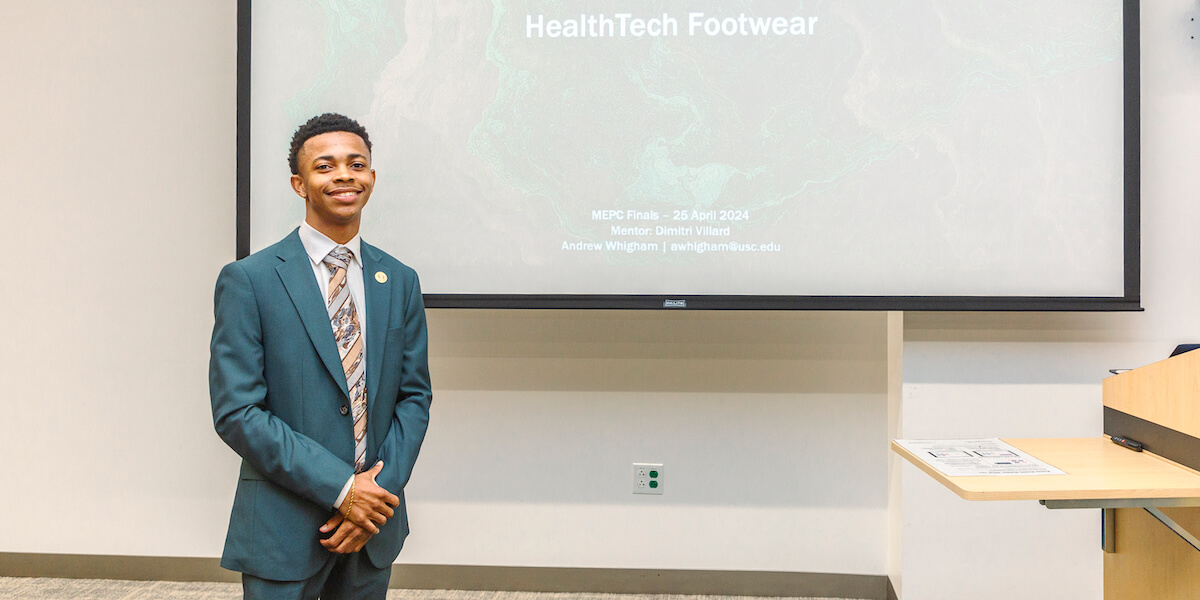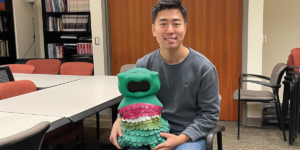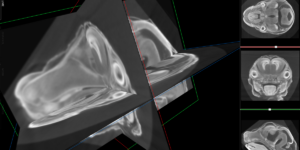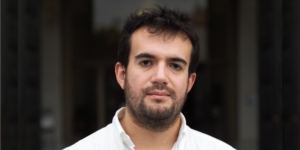
MEPC winner Andrew Whigham, Founder of DiabeTECH (Photo/Angel Ahabue)
For Andrew Whigham, diabetes is personal. The USC Viterbi master’s student in financial engineering watched his grandmother suffer from the chronic disease for years. Whigham, who also holds bachelor’s and master’s degrees in biomedical engineering from the University of Miami, decided to do something about it.
For the past four years, he has worked tirelessly on developing a stylish shoe with a high-tech, sensor-laden insole that would continuously collect circulatory and neurological data on diabetic patients. As envisioned, this important information would be transmitted to a server that podiatrists could easily access. By having the ability to monitor their patients between visits, foot doctors could intervene if any major circulatory or neurological problems emerged, thereby preventing some diabetic-related foot ulcers and even amputations. [Every year, an estimated 154,000 Americans with diabetes have amputations, and the number rising, according to the American Diabetes Association.]
On Thursday, April 25, Whigham’s vision, DiabeTECH, won the 14th annual Maseeh Entrepreneurship Prize Competition, or MEPC, USC Viterbi’s premier business model competition. Whigham took home the grand prize of $50,000, money that he said he plans to use to use for business operations, R&D, to attend conferences, and to further refine his prototype.
“MEPC has given me structure and empowered me to communicate with entrepreneurs, engineers, medical professionals, investors, at a higher level,” said Whigham, who began DiabeTECH as a student at the University of Miami.
This year, 45 teams applied to MEPC, which kicked off in November. Fifteen teams were accepted. Each group received a $250 grant from USC Viterbi’s Office of Technology Innovation and Entrepreneurship, or TIE, for customer discovery and product prototyping.
The field was whittled down to five finalists in early April. Teams competed for $50,000 in cash and $25,000 in legal and business services offered by DLA Piper.
“Teams that complete the MEPC workshops should be on their way to creating companies that can make a meaningful impact,” said Denise McKenzie, MEPC lead instructor and an instructor for the National Science Foundation’s I-Corps program.
Added TIE Managing Director Ralph Lin: “The fact the Viterbi supports both MFC [the Min Family Challenge for social entrepreneurship] and MEPC demonstrates the commitment that USC has towards providing a broad base of education in the fundamentals of engineering, as well as providing opportunities [for students] to hone their entrepreneurial skills.”
MEPC was founded in 2010 thanks to a $1 million endowment from entrepreneur Fariborz Maseeh. To bring more business education to the contest, USC Viterbi partners with the Lloyd Greif Center for Entrepreneurial Studies at USC Marshall.
At the MEPC finals, Maseeh said the quality of the teams impressed him. “Every one of them could be a very viable company,” he said.
MEPC winners
The 2024 MEPC runners-up include:
Runner Up: SIER – Hardware for the vision-impaired
Third Place: EdmX – Desktop metal-cutting machine
Fourth Place: Lens – Digital asset management system
Fifth Place: Silver Spur – Nanoparticle drug for kidney disease
Over the past five months, the USC Viterbi student-led MEPC teams worked to perfect their business models, partnered with mentors who guided and advised them, and attended six workshops on topics like customer discovery, storytelling, and pitching to investors. To deepen teams’ engagement beyond the USC campus ecosystem, finalists had to pitch their ideas to external angel investors, said Lin, the TIE managing director.
The sessions were led by MEPC’s McKenzie; Hovig Tchalian, an assistant professor of clinical entrepreneurship at USC Marshall’s Lloyd Greif Center for Entrepreneurial Studies; and Audra Quinn, also an assistant professor of clinical entrepreneurship at the Lloyd Greif Center
Tchalian said MEPC participants seemed really engaged. “The teams this year especially were very open to feedback and learning, suggesting they internalized many of those lessons,” he said.
Quinn, who taught workshops on prototyping and developing a minimal viable product, said students’ commitment to leveraging innovation for the benefit of humanity resonated with her. “I’ve been most impressed with the teams whose ventures have strong potential to save or enhance lives, including a landmine-detection system that helps civilians to survive in war-torn countries, hardware to support the visually impaired, and a targeted nanoparticle that makes drug delivery more effective,” she said.
Students said they benefitted from participating in MEPC.
“We’ve gotten so much great mentorship from people in the industry, just great feedback,” said SIER member Henry Warren, a sophomore at the Iovine and Young Academy. “I learned what it takes to be a sustainable company.”
An illustrious history
For more than a decade, MEPC has been launching several promising startups.
Last year’s winner, OSEM, is creating a 3D printer to produce nanoparticles more efficiently and accurately. The 2021 MEPC winner, Watershield, created a bio-inspired water barrier, made of silicone-based polymers that adhere to the skin without the use of any chemical irritants, to provide cancer patients with a more comfortable, infection-proof shower experience.
The 2020 MEPC victor, GrayMatter Robotics, uses AI to create smart and rapidly deployable robotic assistants to automate high mix manufacturing tasks, improving quality of life for industrial workers and increasing productivity. The 2019 champion, AIRBOND, now called Apogee Composites, designed a cheaper, more efficient way to produce carbon fiber composite materials for the aviation and other industries.
AesculaTech, the 2016 runner-up, develops and manufactures a platform of temperature-responsive smart materials for use in medical devices, including the treatment of dry eye. After MEPC, AesculaTech participated in Y Combinator, the famed Bay Area business incubator.
Second Spectrum, the 2013 winner, analyzes big data for insights into sports performance, such as what constitutes good defense and offense in basketball. Currently, NBA teams receive Second Spectrum optical tracking data, which powers next-generation analytics.
“We’ve had many wonderful [MEPC] alumni who have won or not but have gone on to have real success,” said Ellis Meng, vice dean of TIE.
Published on May 1st, 2024
Last updated on May 1st, 2024











